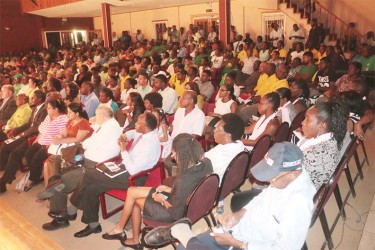APNU+AFC candidate Cathy Hughes last evening said the integration of social services into the police force is needed to begin the process of ending violence against women.
At the first youth and women issues forum, hosted by the Guyana Women Roundtable and the Guyana National Youth Council at the Theatre Guild, Hughes also said the APNU+AFC coalition would implement a Special Victims Unit through the Home Affairs Ministry.
Hughes, who replaced the coalition’s prime ministerial candidate Moses Nagamootoo due to a scheduling conflict, said, “We want to make sure that when a woman goes to report an incident of domestic violence and also when she has been raped or [after] any kind of situation of violence, there is a special unit funded with the requisite social workers, psychologists that can deal with the situation and provide some solutions.”

She added, “What we have found and I have noticed it in the newspaper articles every time a woman, unfortunately, is killed, most of the newspapers reports make mention of the fact that even the neighbour or some family member had a sense that this might have happened… the intervention is not being done at the first signs of abuse that are being displayed.”
As the responses were timed, Hughes ended her opening statements but was given another chance to expand on her opening remarks when the questions were posed. One young women asked how the availability of social workers would be addressed and Hughes stated that it was imperative “to have a qualified trained individual that can act on the first indication and to do that we have to put the requisite funding into our national budget; it has to be something that we make a priority and we fund it as it needs to be funded.”
She said in the area of domestic violence, the level of training needed to be increased as does the remuneration, so persons are inclined to make a career out of the occupation as well as have a living wage.
Hughes said murders and manslaughter are often pre-empted by police reports that have been made prior. Unfortunately, “the training and level of personnel at the police station have not been up to scratch,” she added.
When asked by the moderator of the forum, Derwin Humphrey of Merundoi Inc, if he had anything to add, APNU+AFC coalition presidential candidate David Granger said, “I have a lot to add.”
He emphasised the need for the reform of the police force, which he said is in need of persons who were empathetic. Granger said, “We need persons who are capable of extending sympathetic counsel to victims of violence.”
He said currently a station officer may not be the persons that women would choose to turn to when they have been brutalised. Citing the findings of the Guyana Human Rights Association (GHRA), Granger said, “Many women who have been victims of violence are disinclined to make reports of a sensitive matter to persons who are strangers.”
He also noted that the GHRA has reported extensively on the fact that the majority of rape and domestic crimes fail to make it to the court system and the cases that do rarely result in conviction.
The APNU+AFC presidential hopeful relayed that these were all consequences of the failure in the police force.
He also noted the failings of community policing interventions in Guyana, while criticising vigilante groups.
“When you know there are vulnerable persons in your community—if you do have a system of neighbourhood policing—they will have to protect… they will have to identify the threats and the risks and offer protection but it is not happening now,” Granger told the audience.
“When there are vulnerable persons, like a 75-year-old widow living alone along the Essequibo Coast, this community would know that she is vulnerable,” he said, while citing examples from various communities to support his argument that community policing was not sufficient and constituted a failure of the police force.
Turning his attention to the development of the hinterlands and the measures of progress, Granger noted that teachers there needed to be better compensated. And while also emphasising the need to attract the right persons to the profession, Granger stated that teachers needed to be the highest paid public servants. He cautioned that the current state of education in hinterland communities still meant that parents had to send their children to hostels, which many parents feared because “you send a daughter and get back two.” During his introduction Granger told the attentive audience, which filled the Theatre Guild, that addressing poverty and education reform were the foundations of empowering women and youth. He noted that across Guyana annually 600 students drop out of secondary school, which leads to a potential workforce that is not equipped with adequate reading and writing skills.
He said women, unfortunately, are often forced into a cycle of poverty where they must seek employment as security guards and cleaners. Granger stated that the “endemic” under- and unemployment was across all ten regions, with women suffering the most.
Granger said than in an economy with “jobless growth” reform, it is necessary to take Guyana into real development, which meant having agriculture and manufacturing-based training facilities across the regions to take advantage of Guyana’s wide cottage industry potential.









